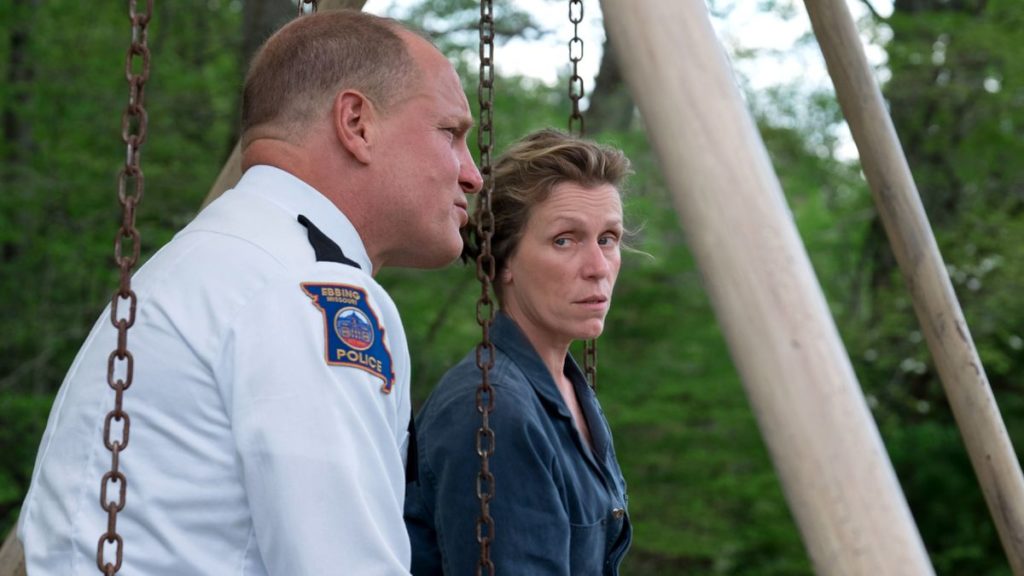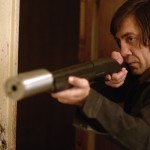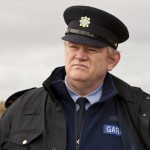Three Billboards Outside Ebbing, Missouri Review

RATING: 



(3 STARS)
There’s a lot one could say about Martin McDonagh’s Three Billboards Outside Ebbing, Missouri, but “You’re an inanimate fucking object!†is not among them.
That iconic quote from McDonagh’s debut, In Bruges, could be at home in the profane and fired-up Three Billboards, but it hardly describes this frantic, frenetic film about justice and grief and, lord, everything under the sun. It’s utterly gripping — I hung onto every word, every scene — but also fascinatingly all over the place. I kind of loved it. It’s kind of a train wreck.
Frances McDormand plays Mildred, a single mother in the titular small Missouri town who’s still reeling emotionally from the rape and murder of her daughter, Angela (Kathryn Newton), which remains unsolved to date. While driving through a rarely traveled section of town, she spots three billboards in a row that haven’t been used for advertising in decades, so she pays $5,000 in cash for a month’s worth of messaging:
“Raped While Dyingâ€
“And Still No Arrestsâ€
“How Come, Chief Willoughby?â€
The chief is played by Woody Harrelson. He’s a genial, family man who also happens to be dying of cancer. The lack of resolution in Angela’s case bothers him, but that pain isn’t enough for Mildred. She wants his attention back on her dead daughter, and the billboards certainly garner plenty of that. Some of it is unwanted — the townspeople feel for her but don’t like the way she’s going after the nice chief — but she’ll live with that if it means getting another crack at justice for Angela.
The third figure in the film’s leading trio of characters is Dixon (Sam Rockwell), an officer who works under Willoughby and has anger issues and a history of excessive violence toward African-Americans. While Mildred’s billboards are explicitly directed toward Willoughby, and she faces the social consequences of this, her anger is more pointed toward people like Dixon, who seem to be happy just lording their gun and badge over the rest of the town.
The film’s biggest problem lies in its leaving character details on the table. The most egregious example of this is Dixon’s racism, which seems like it’s included only to introduce him as an especially despicable figure. As he turns a corner, we’re meant to forget or ignore this aspect of his personality, which makes a lot of the film’s final act feel both false and somewhat irresponsible. Sam Rockwell does his damned best, but the character is all over the place.
For all the problems with this character, Mildred explodes of the screen, and Frances McDormand’s performance is simply spectacular. Her grief manifests itself as violently defensive at times, and as such, she tends to find herself kicking school children in the nuts or lobbing Molotov cocktails out a second-story window. She also has moments (usually alone) of vulnerable clarity, like when she’s visited at the billboards by a deer she calls Angela. She’s a beautifully realized individual — as well written as she is acted — and when Three Billboards’ mistakes subside, she’s there standing tall.
Woody Harrelson is also quite good as Willoughby, arguably the character for whom our sympathy is most morally challenging. He just seems like a good guy, even though there’s plenty of evidence to suggest his passive “goodness†is super problematic. Abbie Cornish has a few good moments as Mrs. Willoughby. Also solid in supporting roles are Lucas Hedges (Mildred’s son) and Caleb Landry Jones (the advertising salesman).
I am a bigger fan of McDonagh’s previous two films (with the extra zany Seven Psychopaths sitting atop the trio) because they don’t tread into territory that feels above them. I can’t shake that feeling with Three Billboards. It’s simply not up to the task of meeting its brutally ambitious goals head on. That doesn’t mean the effort isn’t valiant or interesting. In fact, Three Billboards failures make it one of the most engaging discussion pieces of the year so far. But when it comes to the finished product, everything it gives you isn’t quite enough — at least not for the unqualified rave so many seem happy to throw its way.














One Response to Three Billboards Outside Ebbing, Missouri Review